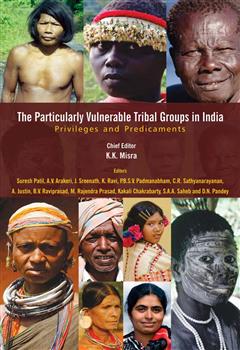INDIA
THE PARTICULARLY VULNERABLE TRIBAL GROUPS IN INDIA: PRIVILEGES AND PREDICAMENTS

Considering the enormous cultural plurality of India and uneven socio-economic development of its people, the Government of India listed certain communities as Scheduled Tribes (STs) for initiating development programmes and providing assured representation. Despite such provisions, in case of a few groups, the common programmes did not appear to make any headway. In fact, their population was either stagnant or declining suggesting high mortality rates. In order to ensure the develop-ment of these poorest of the poor among the ST communities, certain groups were identified initially in 1975. The criteria fixed for identification included declining or stagnant population, very low level of literacy and pre-agricultural level of technology. Thus 75 groups among the ST communities of India were identified in 17 States and
1 Union Territory, who initially were called Primitive Tribal Groups (PTGs), and later renamed as Particularly Vulnerable Tribal Groups (PVTGs).
During April to June 2012 the Anthropological Survey of India carried out a study of all the PVTGs. Its research teams visited various States, concerned tribal development agencies and non-government organizations. The survey was conducted with emphasis on gathering data on their socio-economic status and development. The team also visited the PVTG hamlets, interviewed the people, and recorded their observations
with regard to development. Socio-economic status of each PVTG is described in the volume while a summary including a few suggestions is given in the introduction. About the Author Kamal Kant Misra is a former Director of the Anthropological Survey of India, Kolkata.
Suresh Patil is a former Deputy Director of the Anthropological Survey of India, Kolkata.
C.R. Sathyanarayanan is a former Joint Director of the Anthropological Survey of India, Central Regional Centre, Nagpur.
Kakali Chakrabarty is a former Deputy Director of the Anthropological Survey of India, Eastern Regional Centre, Kolkata.
Anstice Justin is a former Deputy Director of the Anthropological Survey of India, Kolkata.
Digvijay Nath Pandey is a former Senior Ecologist of the Anthropological Survey of India, Kolkata.
J. Sreenath is a former Superintending Anthropologist of the Anthropological Survey
of India, Central Regional Centre, Nagpur.
A.V. Arakeri is a former Superintending Anthropologist of the Anthropological Survey
of India, Western Regional Centre, Udaipur.
Kattoju Ravi is a former Superintending Anthropologist of the Anthropological Survey
of India, Central Regional Centre, Nagpur.
P.B.S.V. Padmanabham is a former Superintending Anthropologist of the Anthropological Survey of India, Kolkata.
B.V. Raviprasad is a former Assistant Anthropologist of the Anthropological Survey of India, Andaman & Nicobar Regional Centre, Port Blair.
M. Rajendra Prasad is a former Assistant Anthropologist of the Anthropological Survey of India, Southern Regional Centre, Mysore.
S.A.A. Saheb is a former Superintending Anthropologist of the Anthropological Survey of India, Southern Regional Centre, Mysore.
Some more books of similar interest